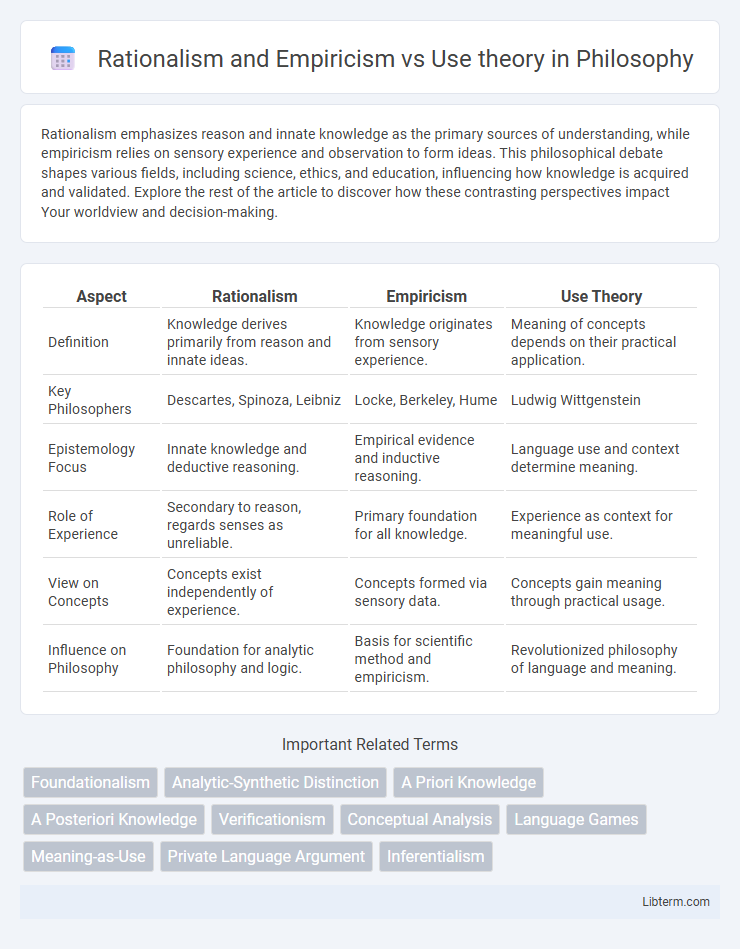Rationalism emphasizes reason and innate knowledge as the primary sources of understanding, while empiricism relies on sensory experience and observation to form ideas. This philosophical debate shapes various fields, including science, ethics, and education, influencing how knowledge is acquired and validated. Explore the rest of the article to discover how these contrasting perspectives impact Your worldview and decision-making.
Table of Comparison
| Aspect | Rationalism | Empiricism | Use Theory |
|---|---|---|---|
| Definition | Knowledge derives primarily from reason and innate ideas. | Knowledge originates from sensory experience. | Meaning of concepts depends on their practical application. |
| Key Philosophers | Descartes, Spinoza, Leibniz | Locke, Berkeley, Hume | Ludwig Wittgenstein |
| Epistemology Focus | Innate knowledge and deductive reasoning. | Empirical evidence and inductive reasoning. | Language use and context determine meaning. |
| Role of Experience | Secondary to reason, regards senses as unreliable. | Primary foundation for all knowledge. | Experience as context for meaningful use. |
| View on Concepts | Concepts exist independently of experience. | Concepts formed via sensory data. | Concepts gain meaning through practical usage. |
| Influence on Philosophy | Foundation for analytic philosophy and logic. | Basis for scientific method and empiricism. | Revolutionized philosophy of language and meaning. |
Introduction to Rationalism, Empiricism, and Use Theory
Rationalism emphasizes reason as the primary source of knowledge, asserting that certain truths are innate and can be accessed through intellectual deduction. Empiricism, contrastingly, posits that knowledge derives from sensory experience and observation, grounding understanding in empirical evidence. Use theory, emerging from linguistic philosophy, highlights the meaning of words as determined by their practical use in language, shifting focus from abstract epistemology to contextual application.
Defining Rationalism: Knowledge Through Reason
Rationalism defines knowledge as primarily derived from reason and intellectual deduction rather than sensory experience, emphasizing innate ideas and a priori knowledge. Unlike empiricism, which bases understanding on sensory data and empirical evidence, rationalism asserts that certain truths can be known independently of experience through logical analysis and rational intuition. This philosophical stance underpins theories such as the use theory of meaning, where understanding is shaped by cognitive structures influenced by reason rather than solely by experiential input.
Understanding Empiricism: Knowledge From Experience
Empiricism emphasizes knowledge derived from sensory experience, asserting that all concepts originate through observation and experimentation, contrasting sharply with Rationalism's reliance on innate ideas and reason. The Use theory of meaning complements Empiricism by linking understanding to practical application and context, highlighting that knowledge is shaped and reinforced by how concepts are employed in real-life situations. This synergy underscores that empirical knowledge evolves through continual interaction with the environment, grounding meaning in experience rather than abstract reasoning alone.
Core Principles of Use Theory
Use theory centers on the principle that the meaning of concepts and knowledge is determined by their practical application and usage within specific contexts, contrasting with Rationalism's emphasis on innate ideas and Empiricism's reliance on sensory experience. This theory argues that understanding emerges from how ideas are employed in real-world scenarios, prioritizing functionality over abstract justification. Core principles include the context-dependent interpretation of knowledge and the rejection of knowledge as purely theoretical or detached from practical use.
Comparing Rationalism and Empiricism
Rationalism asserts that knowledge primarily originates from innate ideas and logical deduction, emphasizing reason as the foundation of understanding. Empiricism argues that experience and sensory input are the sole sources of knowledge, rejecting innate concepts in favor of observation and experimentation. Comparing these theories highlights the tension between a priori reasoning and a posteriori evidence in epistemology, shaping debates about the origins and validation of human knowledge.
Use Theory’s Critique of Traditional Epistemology
Use Theory critiques traditional epistemology by rejecting the emphasis on static knowledge justified solely through rationalism or empiricism. It argues that knowledge must be understood in terms of practical application and contextual use within communities rather than abstract justification or sensory experience alone. This perspective shifts focus from foundational beliefs to the functional role of knowledge in everyday practices, challenging the primacy of both rationalist and empiricist accounts.
Language Acquisition: Rationalism vs. Use Theory
Rationalism in language acquisition emphasizes innate linguistic structures, asserting that humans possess an inherent capacity for grammar and syntax independent of sensory experience. Empiricism, contrasted with rationalism, argues that language emerges primarily from interaction and sensory input, focusing on learning through exposure and reinforcement. Use theory, aligned with empiricism, highlights the functional role of social interaction and contextual use in shaping linguistic competence and meaning over abstract innate knowledge.
Empirical Evidence and the Role of Use in Meaning
Empiricism emphasizes knowledge acquisition through sensory experience and empirical evidence, grounding the validation of concepts in observable data, while Rationalism relies on innate ideas and logical deduction. The Use Theory of Meaning asserts that the significance of terms arises from their practical application within linguistic practices, highlighting the role of usage over abstract definitions. Empirical evidence supports this theory by demonstrating how meaning evolves through actual communicative context rather than fixed semantic content.
Practical Applications: Use Theory in Modern Philosophy
Use theory emphasizes the practical application of language and concepts in everyday contexts, contrasting with Rationalism and Empiricism's focus on epistemological foundations. It prioritizes how meaning is shaped by usage, influencing modern philosophy in areas such as linguistics, cognitive science, and artificial intelligence. This approach enhances the understanding of communication, problem-solving, and adaptive reasoning in real-world scenarios.
Conclusion: Integrating Rationalism, Empiricism, and Use Theory
Integrating Rationalism, Empiricism, and Use Theory reveals a comprehensive approach where reason and sensory experience collectively inform knowledge acquisition, while the practical application of concepts solidifies meaning and understanding. Rationalism emphasizes innate ideas and logical deduction, Empiricism prioritizes evidence from sensory experience, and Use Theory highlights the contextual function of language in shaping meaning. This interdisciplinary synthesis promotes a balanced epistemology that values foundational truths, empirical validation, and pragmatic use in real-world contexts.
Rationalism and Empiricism Infographic

 libterm.com
libterm.com